A Plastic-Free Celebration
Posted on
 © Image: mel-poole-LUPXhXj2ip0 unsplash
© Image: mel-poole-LUPXhXj2ip0 unsplash
The first synthetic plastic, Bakelite, was invented in the mid-19th century, but the production of plastics began to see significant growth in the 1950s. Since then, their use has grown massively. This has led to extensive environmental damage in a variety of ways. In particular, the consequences of poor waste management have led to extensive plastic pollution, including air pollution and large-scale pollution of the world’s oceans. Plastic breakdown in landfills releases toxins into the atmosphere and groundwater. Plastic debris causes physical and chemical damage to wildlife, particularly marine animals (Ritchie and Roser 2018).
Plastic use is high all year round and set to increase. Now that the holiday season is here, with the increased time spent with family and friends enjoying some festive spirit, we see a huge amount of extra waste generated, a challenge for us all. Without even considering food waste (which is at its highest during the festivities), most discarded materials are made of or contain single-use plastics. These materials, such as baubles, clingfilm, wrapping paper and advent calendars, are often non-recyclable. Other non-recyclable items are gifted (e.g., cosmetics) and are the epicentre of festive traditions, such as Secret Santa and crackers. Around 125,000 tonnes of food plastic packaging will be discarded over the festive period this year – roughly the weight of 3.3million Emperor penguins – while Defra estimates that the wrapping paper discarded every year is enough to reach the Moon.
Towards a sustainable holidays celebration
Single-use and non-recyclable plastics have invaded holiday season consumption, but new trends show diverse alternatives. There has been an upsurge in blogs, charities and social media content showing the way to a more sustainable winter celebration. From a waste-free Secret Santa to reusable gift wrapping and advent calendars, we collected some ideas to avoid non-recyclable plastics to celebrate this holiday season.
Enjoy this tasty and fun challenge!
Furoshiki
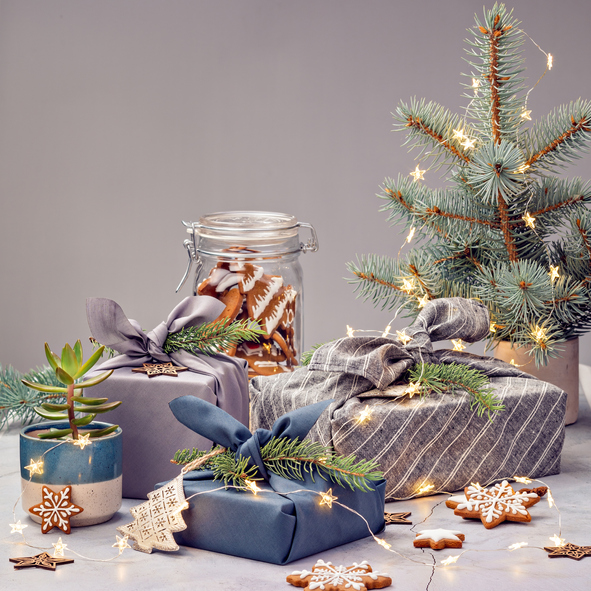
Wrapping gifts often include plastic ribbons and metallic wrapping papers that are not recyclable and destined to landfill or incineration (depending on your council waste management system).
Furoshiki is a great waste-free way to wrap your gifts. There has been a resurgent fashion for furoshiki, a type of wrapping cloth used in the eighth century to protect valuable items. Today, it is often used to wrap gifts and replace plastic bags and has been the focus of lots of Tiktok videos, such as this one.
Beeswax Film
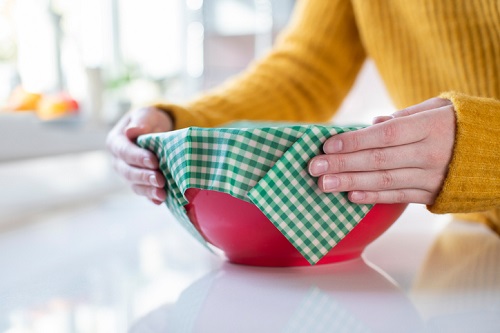
The holidays season usually brings parties, family meals and office dinners – and the leftovers become great ready-to-eat meals in the following days. Clingfilm is a comfortable choice, but it is not recyclable, and it is single-use. Beeswax film is a formidable alternative! Beeswax wraps are durable and add extra colour to your fridge and kitchen. These wraps can be a nice gift idea and be used for packaging food presents too!
Plastic-Free Cosmetics
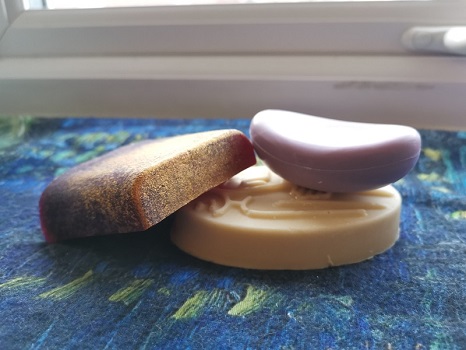
Cosmetics always make a great gift, but many products still contain microplastics. Microplastics in cosmetics have become a notorious design error, thanks to campaigns, for example, the “Beat the Micro Bead” launched by the Plastic Soup Foundation. Several brands now offer plastic-free cosmetics and packaging-free options – treat yourself with a micro beads-free bubble bath or a fragrant soap bar.
Edible Christmas Decorations
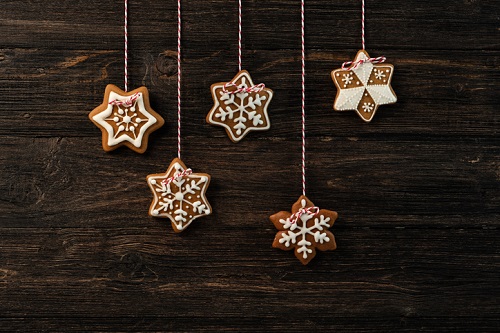
Tinsel and baubles make the holiday season colourful and festive – and are normally full of plastic and covered in glitters that are not recyclable and easy to contaminate the surrounding environment as they spread extremely easily.
How about making your own home-baked Christmas decorations to hang around your home or on your tree? You can have some fun thinking up tasty treats that will also look pretty as decorations…How about cookies, a slice of dried fruits or strings of popcorn?
Plastic-Free Secret Santa
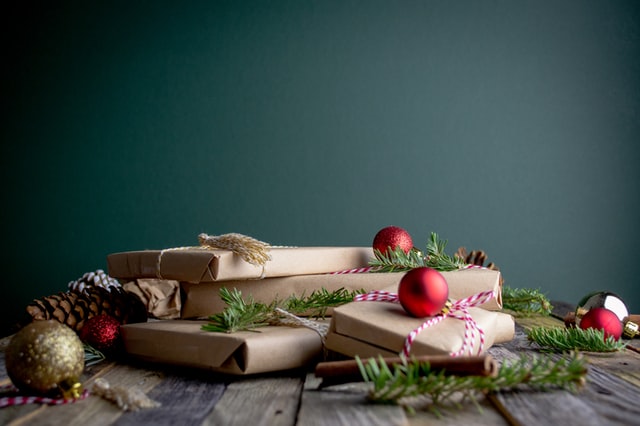
It is great to receive small presents from your co-workers or friends – however, because of budget limits and little time, most of the items gifted are made of non-recyclable plastics or wrapped in single-use packaging. Let’s be creative this year! Do a favour to future generations by avoiding non-recyclable plastic items. Reuse something from home, buy some loose tea leaves, bake some cookies or get something from local craft shops!
Reusable Advent Calendar
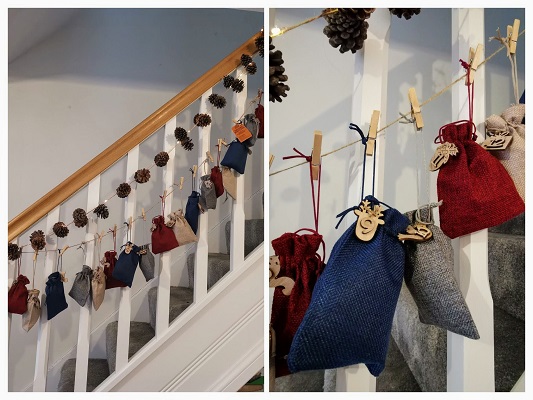
Choose a reusable and plastic-free advent calendar! Advent calendars are not just pictures behind windows, but they have become an opportunity to gift yourself mini gin bottles, fancy chocolates, and jewellery every evening until Christmas.
Advent calendars have now become a type of packaging that requires a large amount of complex single-use and non-recyclable plastics destined for landfill or incineration – adding 3 million tonnes of extra plastic waste created every year over the holiday season. Reusable advent calendars can invert this throw-away trend. There are various options, from a set of wooden boxes to little hemp sachets hanging down a twine. Fill them with your favourite plastic-free items.
Plastic-Free Crackers
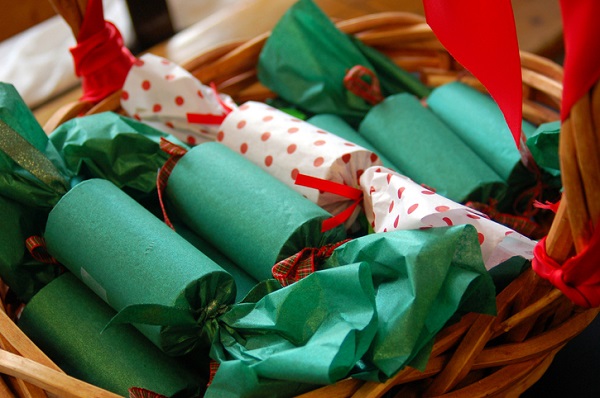
Crackers are a fun tradition and give the opportunity for an extra laugh during a family meal or the office dinner. But they are also full of single-use items, mostly made of non-recyclable plastics.
For those who are really looking for something quirky to add to their plastic-free celebration - try your hand at making your own plastic-free crackers! Generally, you’ll need brown paper, toilet paper tubes, and string to make the crackers, which you can fill with plastic-free treats and your best corny jokes! Here’s more guidance on making your own - beats adding to the unnecessary plastic waste and wrapping that goes into conventional crackers.
Conclusion
The ideas above are just some of the many tips to decrease single-use and non-recyclable plastic waste during this holiday season. They demonstrate that traditions can be tweaked toward a more sustainable approach while having fun and supporting businesses, charities and start-ups that propose alternatives to the throw-away festive culture.
Written by Marta Ferri, Maria Piacentini, Alison Stowell, James Cronin, Charlotte Hadley, John Hardy, Linda Hendry, Matteo Saltalippi, Alex Skandalis, Savita Verma
Disclaimer
The opinions expressed by our bloggers and those providing comments are personal, and may not necessarily reflect the opinions of Lancaster University. Responsibility for the accuracy of any of the information contained within blog posts belongs to the blogger.
Back to blog listing

